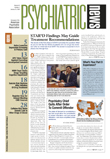A young career woman in Chicago, “Liz,” was under a lot of stress. The stress led to anxiety, which led to chest pains, which led to a panic attack. She rushed to the hospital emergency room, convinced that she was seriously ill.
If Liz had engaged in strenuous physical activity shortly before her panic attack set in, could she have prevented it? Perhaps, a new study out of Germany suggests.
Previous researchers found that physical exercise can reduce anxiety in both healthy individuals and those with panic disorder. Andreas Stroehle, M.D., an assistant professor of psychiatry at Charite-University Medicine Berlin, and coworkers decided to build on that work by conducting a small pilot crossover-design study to see whether an acute round of exercise can prevent panic attacks.
A compound called cholecystokinin tetrapeptide (CCK-4) is known to induce panic attacks reliably in healthy subjects. So Stroehle and his colleagues wanted to see whether exercise or rest would alter CCK-4–induced panic attacks.
They first had 15 healthy subjects, average age 26 years, engage in 30 minutes of aerobic exercise (treadmill walking) before receiving CCK-4. After that, the subjects' psychological responses to CCK-4 were measured with the Acute Panic Inventory.
The subjects then remained in a quiet, restful state before getting CCK-4 the second time. Once again, their psychological responses to CCK-4 were measured with the Acute Panic Inventory.
Finally, Stroehle and his group measured the subjects' psychological responses to CCK-4 under the two conditions.
Panic attacks occurred in 12 subjects after rest, but in only six subjects after exercise, the researchers found. In both conditions, CCK-4 administration was followed by a significant increase in Acute Panic Inventory scores. However, prior exercise resulted in significantly lower scores than quiet rest.
“Our results for the first time suggest that exercise has an acute antipanic activity,” they wrote in the December 2005 American Journal of Psychiatry.
The challenge now, Stroehle and his colleagues continued, is to determine whether acute exercise can also prevent panic attacks in individuals with panic disorder, and if so, what the optimum dosage (intensity and duration) of acute exercise is for preventing an attack. “We are doing further studies in patients,” Stroehle told Psychiatric News.
Also to be answered, Stroehle said, is whether acute exercise might counter a panic attack after it has begun. “Because most panic attacks resolve within about 30 minutes, the beneficial effects [of exercise after an attack has started] are questionable. In addition, in most of the situations where panic attacks occur, cognitive strategies may be more appropriate and applicable than exercise.”
The study was funded by Charite-University Medicine Berlin.
Am J Psychiatry 2005 162 2376
